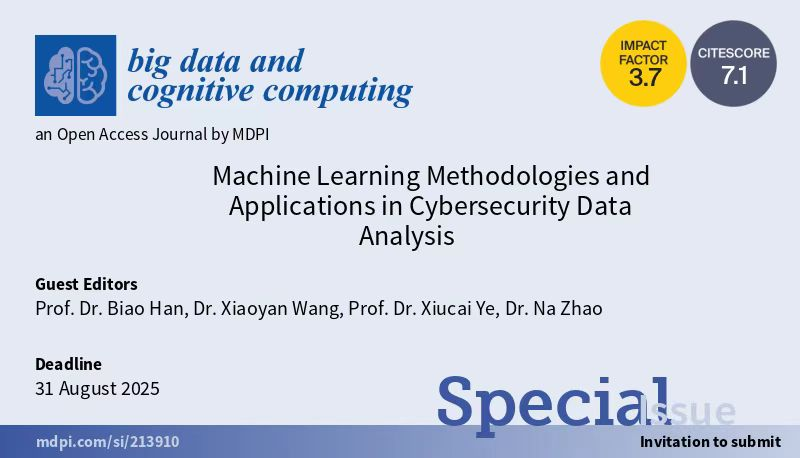

期刊名称:Big Data and Cognitive Computing (ISSN 2504-2289)
特刊名称:Machine Learning Methodologies and Applications in Cybersecurity Data Analysis
重要信息:JCR Q1,影响因子3.7
特刊征稿范围:机器学习、大数据、网络安全、安全与隐私
截止时间:31 August 2025
官方网站:
https://www.mdpi.com/journal/BDCC/special_issues/BZ6H4530N4
Special Issue Information
Machine learning (ML) represents a pivotal technology for current and future information systems, with many domains already leveraging its capabilities. However, ML deployment in cybersecurity is still at an early stage, revealing a significant discrepancy between research and practice. ML is able to quickly analyze large volumes of historical and dynamic data, enabling applications to operationalize data from various sources in near-real time. Recently, we have witnessed the rapid development in ML methodologies and applications for cybersecurity data analysis in threat detection, raw data analysis, and alert management, among others. Yet, in this specific domain, unleashing the full benefits of ML in practice stems from balancing the underlying conflict between the intrinsic characteristics of the cybersecurity domain and the fundamental assumptions of ML.
This Special Issue aims to collect recent advancements in machine learning methodologies and applications targeted towards tackling cybersecurity data challenges, highly valuing interdisciplinary research to contribute new challenges, research questions, approaches, and datasets related to this topic.
This Special Issue invites new research contributions to machine learning methodologies and applications specifically tailored to cybersecurity data analysis challenges. The scope includes but is not limited to the following topics:
ML methods and applications for capturing/handling/evaluating cybersecurity datasets;
ML methods and applications for data-driven cybersecurity decision making;
ML methods and applications for security policy rule generation;
ML methods and applications for protecting valuable security data;
ML methods and applications for context-aware cybersecurity data analysis;
ML methods and applications for feature engineering in cybersecurity;
ML methods and applications for PHY/MAC/L3-L7 security protocol design and evaluation
ML methods and applications for PHY/MAC/L3-L7 security protocol optimization;
ML methods and applications for data-driven network protocol fuzzing;
ML methods and applications for data-driven anomaly/ intrusion detection;
ML methods and applications for data-driven network traffic analysis;
ML methods and applications for data-driven endpoint detection and response;
ML methods and applications for data-driven cybersecurity defense framework;
Cybersecurity datasets/benchmark for data analysis in ML methods and applications;
Cybersecurity prototypes/testbeds for data analysis in ML methods and applications, etc.
Keywords
machine learning
cybersecurity
data science
artificial intelligence
Special Issue Editors
Prof. Dr. Biao Han
Guest Editor
School of Computer, National University of Defense Technology, Changsha 410073, China
Interests: AI for networks; multipath transmission; cybersecurity
Dr. Xiaoyan Wang
Guest Editor
Department of Electrical and Electronic Systems Engineering, College of Engineering, Ibaraki University, Hitachi city, Japan
Interests: wireless communication; wireless sensing; AI; security
Prof. Dr. Xiucai Ye
Guest Editor
Department of Computer Science, University of Tsukuba, Tsukuba 3058577, Japan
Interests: machine learning; data analysis; security; bioinformatics
Department of Information Technology, Hunan Police Academy, Changsha 410000, China
Interests: cybersecurity; deep learning; artificial intelligence for IT operations
Manuscript Submission Information
Manuscripts should be submitted online at www.mdpi.com by registering and logging in to this website. Once you are registered, click here to go to the submission form. Manuscripts can be submitted until the deadline. All submissions that pass pre-check are peer-reviewed. Accepted papers will be published continuously in the journal (as soon as accepted) and will be listed together on the special issue website. Research articles, review articles as well as short communications are invited. For planned papers, a title and short abstract (about 100 words) can be sent to the Editorial Office for announcement on this website.
Submitted manuscripts should not have been published previously, nor be under consideration for publication elsewhere (except conference proceedings papers). All manuscripts are thoroughly refereed through a single-blind peer-review process. A guide for authors and other relevant information for submission of manuscripts is available on the Instructions for Authors page. Big Data and Cognitive Computing is an international peer-reviewed open access monthly journal published by MDPI.
Please visit the Instructions for Authors page before submitting a manuscript. The Article Processing Charge (APC) for publication in this open access journal is 1800 CHF (Swiss Francs). Submitted papers should be well formatted and use good English. Authors may use MDPI's English editing service prior to publication or during author revisions.
Benefits of Publishing in a Special Issue
Ease of navigation: Grouping papers by topic helps scholars navigate broad scope journals more efficiently.
Greater discoverability: Special Issues support the reach and impact of scientific research. Articles in Special Issues are more discoverable and cited more frequently.
Expansion of research network: Special Issues facilitate connections among authors, fostering scientific collaborations.
External promotion: Articles in Special Issues are often promoted through the journal's social media, increasing their visibility.
e-Book format: Special Issues with more than 10 articles can be published as dedicated e-books, ensuring wide and rapid dissemination.

